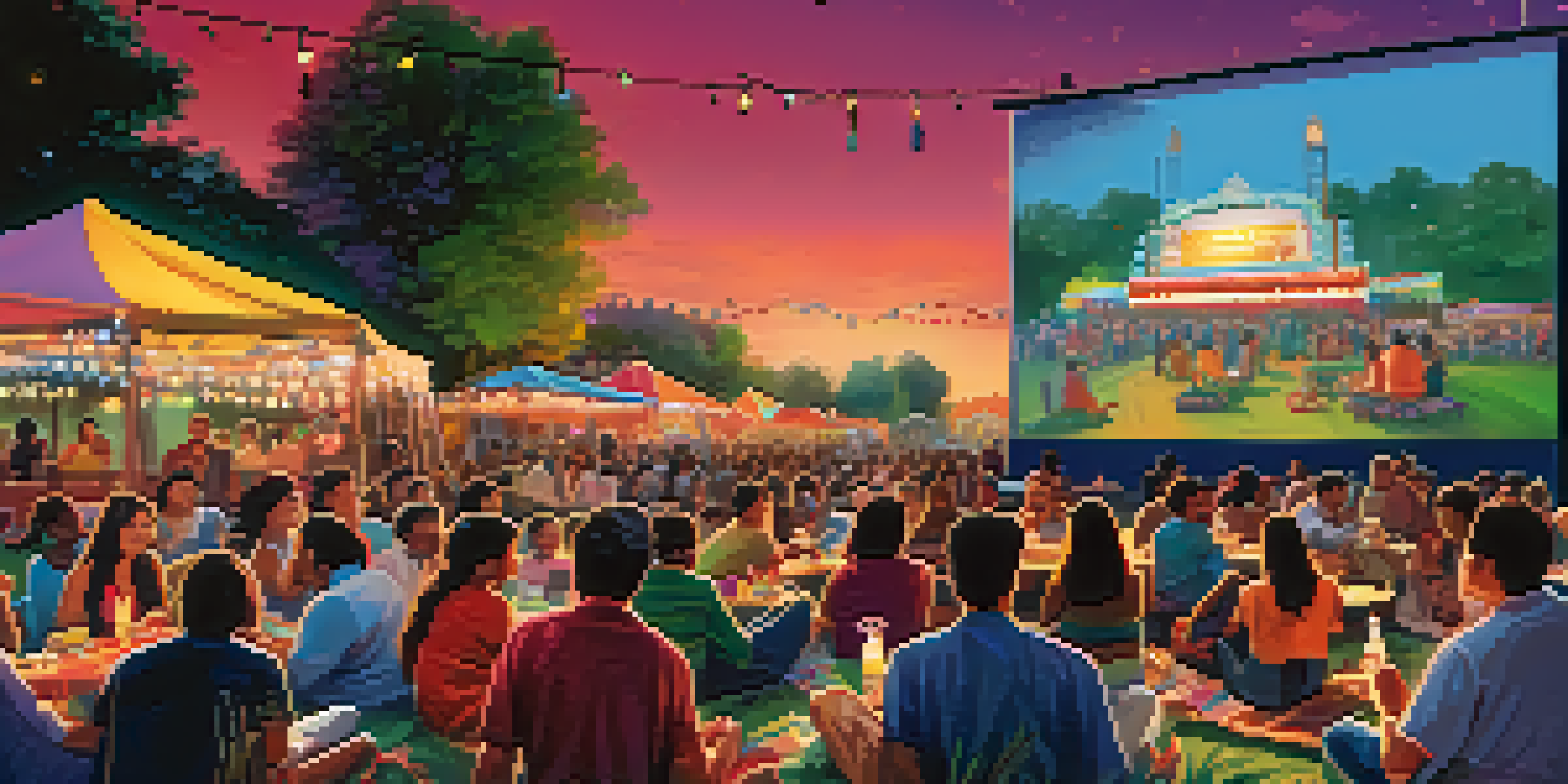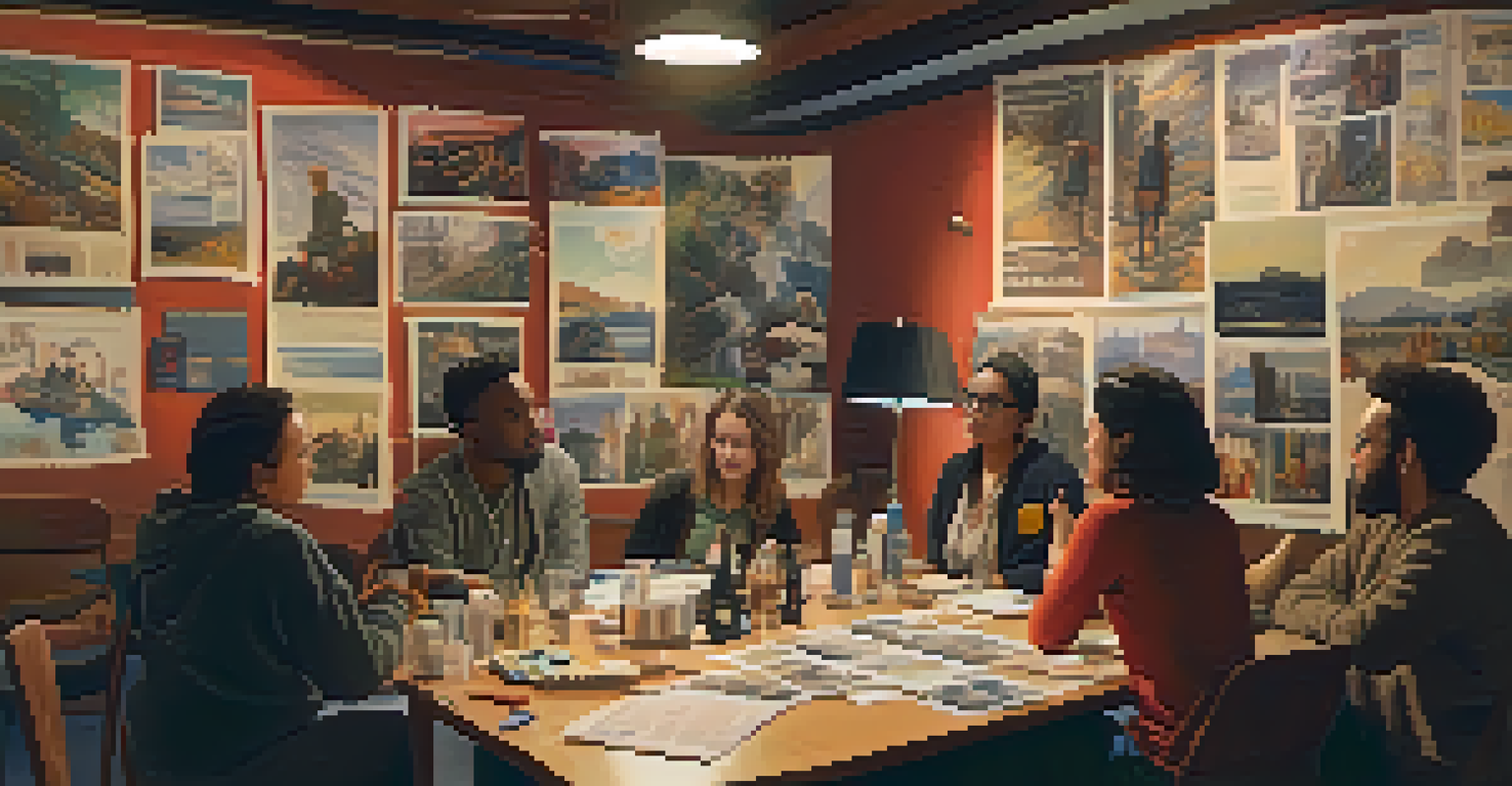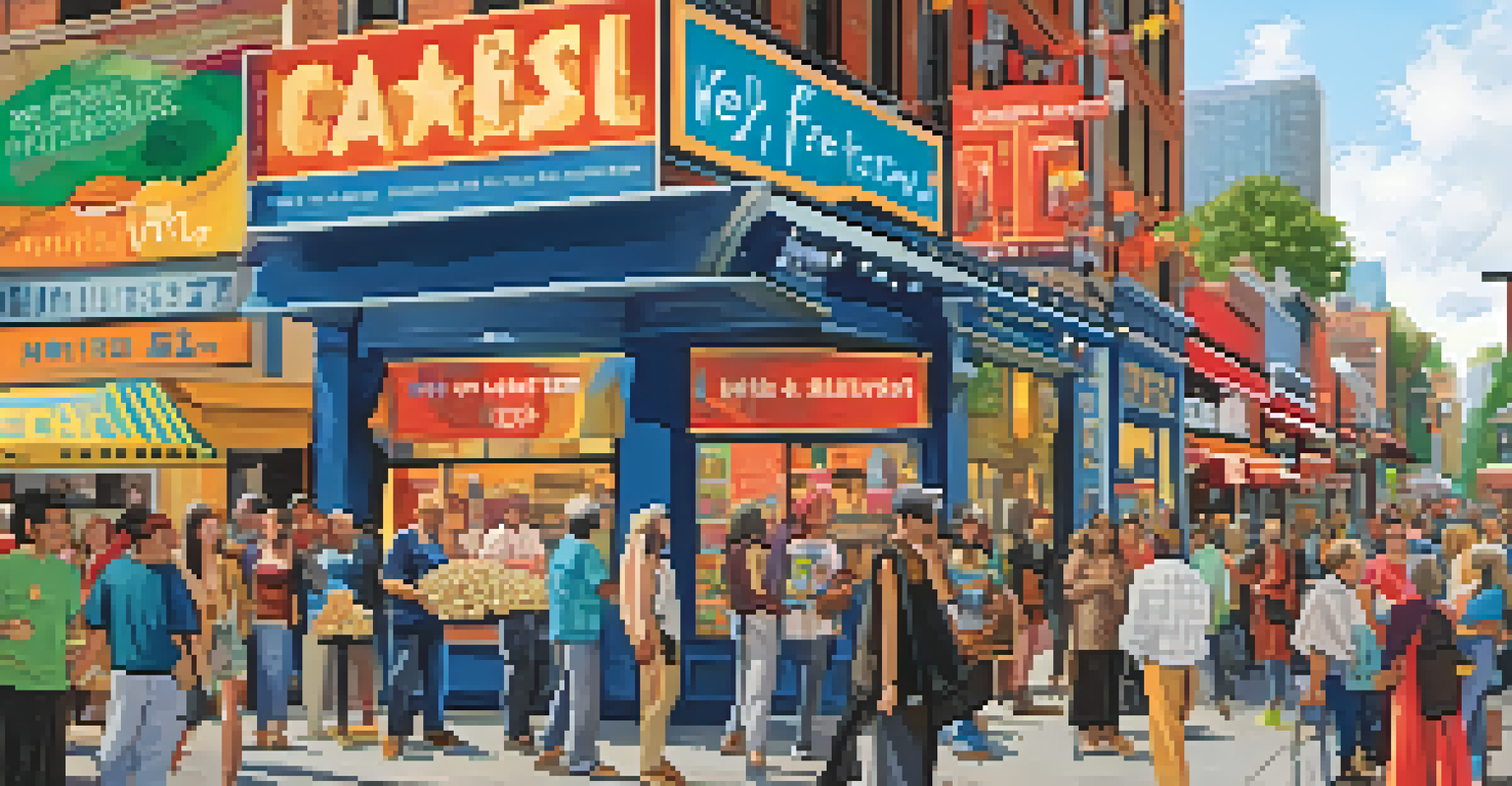The Role of Film Festivals in Promoting Diverse Cultures

Film Festivals: Celebrating Global Narratives and Voices
Film festivals serve as a vibrant platform where diverse cultures converge, showcasing films that reflect a multitude of perspectives. These events not only spotlight international cinema but also provide filmmakers from underrepresented backgrounds the opportunity to share their stories. By presenting unique narratives, festivals foster a deeper understanding and appreciation for cultures that might otherwise remain overlooked in mainstream media.
Film is a universal language that speaks to the heart of humanity.
Attending a film festival is like embarking on a global journey without leaving your seat. Viewers can experience the flavors, traditions, and struggles of different communities through the lens of their filmmakers. For instance, a documentary from a remote village can reveal the daily lives and challenges of its residents, prompting audiences to build empathy and connection with cultures far from their own.
Moreover, these festivals spark conversations around cultural representation, pushing for more inclusive storytelling in the film industry. As filmmakers present their work, audiences engage in discussions that highlight the importance of diversity in art. This exchange not only enriches the festival experience but also promotes a broader dialogue about cultural identity and representation in cinema.
Building Bridges: Film Festivals as Cultural Exchanges
Film festivals act as cultural bridges, connecting filmmakers and audiences from various backgrounds. By facilitating interactions between creators and viewers, these events foster a sense of community and mutual respect. This atmosphere of collaboration creates a unique space for sharing ideas and experiences, helping to break down cultural barriers.

Networking opportunities abound at festivals, where filmmakers can establish connections that extend beyond the event. These relationships often lead to future collaborations and projects, promoting a continuous exchange of cultural ideas. For instance, a filmmaker from Africa might partner with a producer from Europe, blending their distinct styles and influences to create something entirely new.
Cultural Exchange Through Film
Film festivals connect diverse filmmakers and audiences, fostering community and breaking down cultural barriers.
Additionally, film festivals often host workshops and panels that delve into cultural themes and practices. These sessions not only educate attendees about different traditions but also empower filmmakers to explore their cultural heritage in their work. As a result, film festivals become a melting pot of creativity, where diverse perspectives inspire innovative storytelling.
Promoting Underrated Films and Filmmakers
Many films that screen at festivals may never find their way into mainstream theaters, often due to limited marketing budgets or niche topics. Festivals provide these underrated films an invaluable platform to shine, allowing them to reach audiences who appreciate unique storytelling. This exposure can lead to critical acclaim and even distribution deals, offering filmmakers a chance to share their work with a broader audience.
Cinema is a matter of what's in the frame and what's out of it.
For example, a small indie film about a culturally significant event may resonate with festival-goers, sparking interest and discussion. This buzz can translate to greater visibility and opportunities for the filmmakers involved. As audiences discover these hidden gems, they contribute to a richer cinematic landscape that celebrates diverse voices.
Moreover, by championing lesser-known filmmakers, festivals challenge the dominance of mainstream narratives. They encourage filmmakers to take risks and explore unconventional topics, fostering a culture of innovation and creativity. In doing so, they help to diversify the cinematic experience, allowing audiences to engage with stories that reflect the complexities of our global society.
Encouraging Local Economies Through Cultural Tourism
Film festivals often transform cities and towns into cultural hubs, attracting visitors and boosting local economies. As film lovers travel to attend screenings, they contribute to the hospitality industry, dining in local restaurants and staying in nearby hotels. This influx of visitors can have a significant impact, providing economic opportunities for the community.
For example, a town hosting an annual film festival might see a surge in tourism, with attendees eager to explore the area while enjoying the cinematic experience. This not only benefits businesses but also raises awareness of the region's cultural offerings. In turn, local artists and filmmakers gain visibility, showcasing their work alongside international talent.
Spotlight on Underrated Films
Festivals provide a platform for lesser-known films, allowing unique stories to gain visibility and challenge mainstream narratives.
Furthermore, the success of a film festival can inspire future cultural events, creating a cycle of growth and engagement. As communities recognize the value of cultural tourism, they may invest in infrastructure and support for local artists, fostering a thriving creative ecosystem. In this way, film festivals become catalysts for cultural exchange and economic development.
Spotlighting Social Issues and Cultural Challenges
Film festivals frequently highlight important social issues, providing a platform for dialogue around cultural challenges. By showcasing films that address topics such as immigration, inequality, and environmental concerns, festivals encourage audiences to engage with these pressing matters. This engagement can lead to increased awareness and advocacy for change within communities.
For instance, a festival might feature a documentary exploring the struggles of refugees, sparking conversations about empathy and humanitarian aid. Through the power of storytelling, these films can shift perceptions and inspire action, encouraging audiences to take a stand on social issues that matter. By creating a space for these discussions, festivals play a crucial role in promoting social consciousness.
Additionally, filmmakers often use their work to reflect their cultural experiences and challenges, bringing attention to their communities' stories. This representation is vital for fostering understanding and compassion among diverse audiences. As viewers are exposed to various cultural narratives, they are more likely to become advocates for social justice and cultural preservation.
Fostering Future Generations of Diverse Filmmakers
Film festivals not only celebrate established filmmakers but also nurture emerging talent from diverse backgrounds. Many festivals offer mentorship programs, workshops, and grants designed to support young filmmakers in developing their skills and projects. This investment in the next generation is essential for ensuring that diverse voices continue to be heard in the film industry.
By providing a platform for young filmmakers, festivals create opportunities for them to showcase their work and connect with industry professionals. This exposure can be a game-changer for budding artists, helping them to build their careers and gain recognition. For example, a short film presented at a festival might catch the attention of a producer, leading to further opportunities.
Boosting Local Economies
Film festivals attract tourism, benefiting local businesses and inspiring future cultural events within communities.
Furthermore, festivals often prioritize diversity in their programming, ensuring that the films selected reflect a wide range of experiences and perspectives. This commitment to inclusivity encourages aspiring filmmakers from all backgrounds to tell their stories. As these individuals gain visibility, they inspire others to pursue their passions, contributing to a more vibrant and diverse film landscape.
The Lasting Impact of Film Festivals on Cultural Awareness
The influence of film festivals extends far beyond the event itself, leaving a lasting impact on cultural awareness and appreciation. By introducing audiences to new perspectives and stories, festivals encourage viewers to explore and celebrate diversity in their own lives. This ripple effect fosters a more inclusive society that values different cultures.
As attendees leave the festival, they carry with them the stories and experiences they encountered, prompting them to seek out more diverse content in the future. This shift in perspective can lead to an increased demand for films that highlight underrepresented voices and narratives. In turn, filmmakers are encouraged to create more inclusive stories, further enriching the cinematic landscape.

Ultimately, film festivals serve as a reminder of the power of storytelling to shape our understanding of the world. By promoting diverse cultures and fostering meaningful connections, these events play a vital role in cultivating empathy and cultural appreciation. As we celebrate the art of film, we also embrace the rich tapestry of human experience that unites us all.